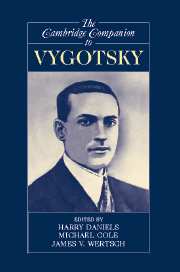Book contents
- Frontmatter
- Editors’ Introduction
- Part I: Vygotsky in Context
- Part II: Readings of Vygotsky
- 6 Terminology in L. S. Vygotsky’s Writings
- 7 Mediation
- 8 Vygotsky and Culture
- 9 Thought and Word: The Approaches of L. S. Vygotsky and G. G. Shpet
- 10 The Development of Children’s Conceptual Relation to the World, with Focus on Concept Formation in Preschool Children's Activity
- 11 Inside and Outside the Zone of Proximal Development: An Ecofunctional Reading of Vygotsky
- Part III: Applications of Vygotsky’s Work
- References
- Index
10 - The Development of Children’s Conceptual Relation to the World, with Focus on Concept Formation in Preschool Children's Activity
from Part II: - Readings of Vygotsky
Published online by Cambridge University Press: 28 November 2007
- Frontmatter
- Editors’ Introduction
- Part I: Vygotsky in Context
- Part II: Readings of Vygotsky
- 6 Terminology in L. S. Vygotsky’s Writings
- 7 Mediation
- 8 Vygotsky and Culture
- 9 Thought and Word: The Approaches of L. S. Vygotsky and G. G. Shpet
- 10 The Development of Children’s Conceptual Relation to the World, with Focus on Concept Formation in Preschool Children's Activity
- 11 Inside and Outside the Zone of Proximal Development: An Ecofunctional Reading of Vygotsky
- Part III: Applications of Vygotsky’s Work
- References
- Index
Summary
Two of Vygotsky's (1997) central theoretical points are that cultural- historically developed tools mediate the child's relation to the world and that the competence to handle such tools is acquired in social settings through guidance from others. His theory of concept formation for preschoolers, schoolchildren, and adolescents explains how the practice of institutional activities influences children's concept formation (Vygotsky, 1987, 1998a). Small children participate in the everyday activities at home; schoolchildren meet the academic world in school, which he points out as a necessity for schoolchildren's development of scientific concepts; and adolescents get acquainted with the activities in work life, a necessity for their development of dialectical concepts.
Vygotsky describes how very young children appropriate concepts of tools and objects through interaction with their caregivers and, as an example, he exemplifies this with how a child learns to use a spoon in interaction with his caregivers (Kravtsov & Berezlizhkaya, 1999). In his theory, Vygotsky characterizes small children's and preschool children's concepts as everyday concepts developed spontaneously in collaboration with others through everyday activities. He contrasts these concepts to schoolchildren's concepts, which he characterizes as scientifically developed through systematic school instruction.
Although Vygotsky describes the concept learning of preschool children as inscribed in the social practice of everyday activities, what he primarily draws on when describing preschool children's concept formation is an experiment with the double-stimulation method (Vygotsky, 1987 p. 130ff). In this experiment, children's task is to sort blocks that vary in form, size, and color, gradually finding the sorting principle because a meaningless label is attached to the bottom of each block that is turned over each time the child has chosen one.
- Type
- Chapter
- Information
- The Cambridge Companion to Vygotsky , pp. 246 - 275Publisher: Cambridge University PressPrint publication year: 2007
- 21
- Cited by

